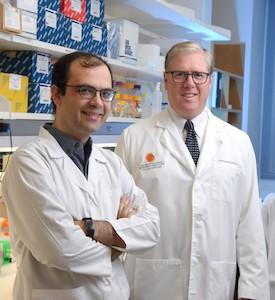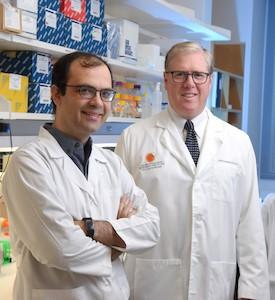
Credit: UT Southwestern
DALLAS – August 21, 2017 – Not much is known about stem cell metabolism, but a new study from the Children's Medical Center Research Institute at UT Southwestern (CRI) has found that stem cells take up unusually high levels of vitamin C, which then regulates their function and suppresses the development of leukemia.
"We have known for a while that people with lower levels of ascorbate (vitamin C) are at increased cancer risk, but we haven't fully understood why. Our research provides part of the explanation, at least for the blood-forming system," said Dr. Sean Morrison, the Director of CRI.
The metabolism of stem cells has historically been difficult to study because a large number of cells are required for metabolic analysis, while stem cells in each tissue of the body are rare. Techniques developed during the study, which was published in Nature, have allowed researchers to routinely measure metabolite levels in rare cell populations such as stem cells.
The techniques led researchers to discover that every type of blood-forming cell in the bone marrow had distinct metabolic signatures – taking up and using nutrients in their own individual way. One of the main metabolic features of stem cells is that they soak up unusually high levels of ascorbate. To determine if ascorbate is important for stem cell function, researchers used mice that lacked gulonolactone oxidase (Gulo) – a key enzyme that most mammals, including mice but not humans, use to synthesize their own ascorbate.
Loss of the enzyme requires Gulo-deficient mice to obtain ascorbate exclusively through their diet like humans do. This gave CRI scientists strict control over ascorbate intake by the mice and allowed them to mimic ascorbate levels seen in approximately 5 percent of healthy humans. At these levels, researchers expected depletion of ascorbate might lead to loss of stem cell function but were surprised to find the opposite was true – stem cells actually gained function. However, this gain came at the cost of increased instances of leukemia.
"Stem cells use ascorbate to regulate the abundance of certain chemical modifications on DNA, which are part of the epigenome," said Dr. Michalis Agathocleous, lead author of the study, an Assistant Instructor at CRI, and a Royal Commission for the Exhibition of 1851 Research Fellow. "The epigenome is a set of mechanisms inside a cell that regulates which genes turn on and turn off. So when stem cells don't receive enough vitamin C, the epigenome can become damaged in a way that increases stem cell function but also increases the risk of leukemia."
This increased risk is partly tied to how ascorbate affects an enzyme known as Tet2, the study showed. Mutations that inactivate Tet2 are an early step in the formation of leukemia. CRI scientists showed that ascorbate depletion can limit Tet2 function in tissues in a way that increases the risk of leukemia.
These findings have implications for older patients with a common precancerous condition known as clonal hematopoiesis. This condition puts patients at a higher risk of developing leukemia and other diseases, but it is not well understood why certain patients with the condition develop leukemia and others do not. The findings in this study might offer an explanation.
"One of the most common mutations in patients with clonal hematopoiesis is a loss of one copy of Tet2. Our results suggest patients with clonal hematopoiesis and a Tet2 mutation should be particularly careful to get 100 percent of their daily vitamin C requirement," Dr. Morrison said. "Because these patients only have one good copy of Tet2 left, they need to maximize the residual Tet2 tumor-suppressor activity to protect themselves from cancer."
Researchers in the Hamon Laboratory for Stem Cell and Cancer Biology, in which Dr. Morrison is also appointed, intend to use the techniques developed as part of this study to find other metabolic pathways that control stem cell function and cancer development. They also plan to further explore the role of vitamin C in stem cell function and tissue regeneration.
###
Dr. Morrison is a Professor of Pediatrics at UT Southwestern, a Cancer Prevention and Research Institute of Texas (CPRIT) Scholar in Cancer Research, and a Howard Hughes Medical Institute (HHMI) Investigator. He also holds the Mary McDermott Cook Chair in Pediatric Genetics at UT Southwestern and the Kathryne and Gene Bishop Distinguished Chair in Pediatric Research at Children's Research Institute at UT Southwestern.
CRI and UTSW co-authors include Dr. Zhiyu Zhao, Assistant Professor at CRI and of Pediatrics at UT Southwestern; Dr. Weina Chen, Associate Professor of Pathology at UT Southwestern; Dr. Corbin Meacham, Dr. Rebecca Burgess, and Dr. Malea Murphy, postdoctoral researchers; and Dr. Ralph DeBerardinis, Associate Professor at CRI, of Pediatrics, and in the Eugene McDermott Center for Human Growth & Development. Dr. DeBerardinis, who holds the Joel B. Steinberg, M.D. Chair in Pediatrics and is a Sowell Family Scholar in Medical Research at UTSW, also is the Director of CRI's Genetic and Metabolic Disease Program and Chief of the Division of Pediatric Genetics and Metabolism at UTSW.
The National Institutes of Health, HHMI, CPRIT, and donors to the Children's Medical Center Foundation supported this work.
About CRI
Children's Medical Center Research Institute at UT Southwestern (CRI) is a joint venture of UT Southwestern Medical Center and Children's Medical Center Dallas, the flagship hospital of Children's Health. CRI's mission is to perform transformative biomedical research to better understand the biological basis of disease. Located in Dallas, Texas, CRI is home to interdisciplinary groups of scientists and physicians pursuing research at the interface of regenerative medicine, cancer biology and metabolism. More information is available on our website. You may also support CRI by donating.
Media Contact
Katie Regan
[email protected]
214-648-2378
@UTSWNews
http://www.swmed.edu





